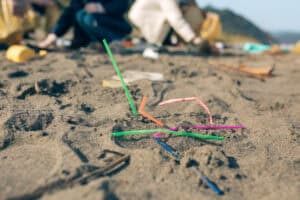Contrary to popular belief, not all plastic products are recyclable, and unfortunately, South Africa’s unrecyclable recycling infrastructure still needs some work.

For us to actively minimise waste, recycling can be turned into positive lifestyle change that is easily adopted in any household. This pertains especially to plastic products. But not all plastic products are recyclable. And currently, these unrecyclables still end up on our landfill sites.
According to Pikitup managing director Lungile Dhlamini, the issue of unrecyclable materials is an ongoing challenge, but the organisation has plans to mitigate unsustainable behaviour. “We’re looking to create a body, similar to Green Cape, where you have a multistakeholder forum, and they have expertise and resources, which we can pull together.”
Interesting developments in the sector seek to minimise illegal dumping and littering, and pool budgets used for illegal dumping into stakeholder engagement, education and awareness. Dhlamini emphasises that this is the only way to ensure that the long-term solution to plastic waste is sustainable.
In the meantime, however, residents can be made aware of what exactly can go into your blue or clear bag, and what materials will unfortunately still end up on a landfill site. In this way, consumers can aim to use products with plastic packaging that can be recycled.

Infographic: Costa Makola
Here is a list of some recyclables and unrecyclables to stick on your fridge:
Recyclables
Remember to rinse all items thoroughly before recycling.
- Soda drink bottles, fruit juice bottles, clear mineral water bottles and tubs
- Milk bottles and cartons, chemical drums, packaging films, domestic cleaning agent bottles, crates, pallets and bins
- Pouches and cap liners
- Clear jars, blister packaging, food packaging, peel-able lids, bubble wrap, boutique shopping bags, foam sheeting and bread bags
- Yoghurt tubs, margarine tubs, ice-cream containers, bottle caps, woven bags, oven bags and takeaway food containers
Unrecyclables
You can attempt to upcycle these items and use them around your home, effectively minimising items that end up on landfill sites.
- Car parts
- Plastic shopping (carrier) bags
- Contaminated domestic cling films
- Cosmetic and personal care containers
- Hot water pipes and cable insulation
- Electronic waste
- Labels
- Multilayer and multimaterial packaging films, used for improved shelf life
- Multilayer PET bottles, usually in the form of energy drink bottles, alcoholic beverages and ciders
- Oxo-biodegradable films
- PET films and sheeting, such as sandwich trays and confectionary packaging
- Soiled PVC-U packaging
- PET films and sheeting
On a positive note, retailers are beginning to respond to the plight of unrecyclable carrier bags. Pick n Pay announced earlier this week that it had created a compostable range of plastic bags. The bags were introduced at Cape Town’s V&A Waterfront on July 3, and a nationwide rollout is planned for August this year.

A home compostable plastic bag. Image: Business Insider website
The plastic bags are made of vegetable matter, starches and cellulose, and are expected to break down after three to six months – a vast improvement from the current 500 to 1000 years it takes for carrier bags to decompose.
Consumers can use these bags to collect their organic waste, and will compost with organic waste, Pick n Pay director for transformation Suzanne Ackerman-Berman explained.
An added perk is that these bags are stronger and can therefore be reused more often.
Pick n Pay is also piloting the purchase of cardboard boxes instead of plastic bags, at R5 each.

Suzanne Ackerman-Berman at the V&A Waterfront Pick n Pay with a cardboard box that consumers can opt to buy. Image: Business Insider SA website
Spar has also committed to stopping the sale of single-use plastic bags on July 3, at its Western Cape and Namibian stores. Spar has already rolled out a campaign in April, encouraging consumers to opt for paper bags that are available in-store at their Eastern Cape stores. Woolworths has also expressed its commitment to eliminate packaging waste to landfill sites.
Sources: Plastic Recycling SA website, Business Insider SA website
For more news your way, download The Citizen’s app for iOS and Android






